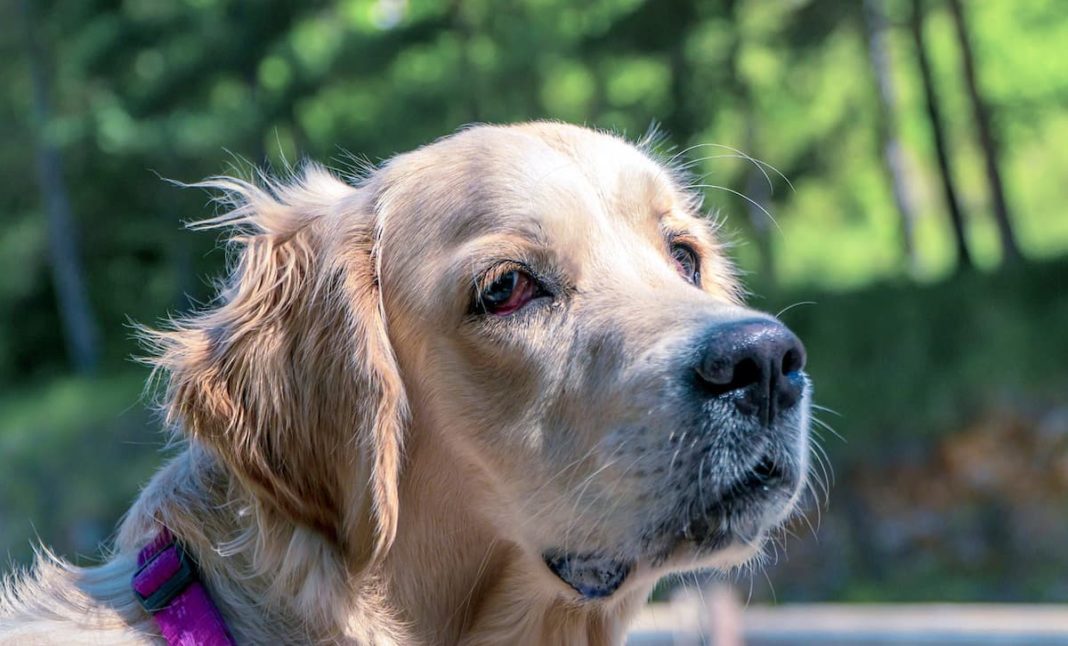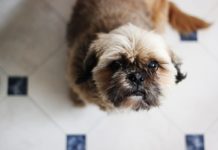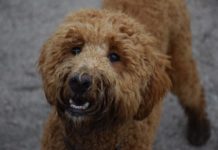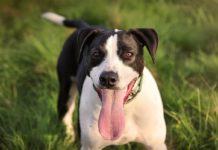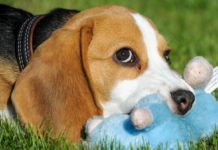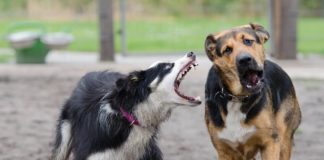When it comes to drooling in golden retrievers, “normal” is a relatively general term. Saliva/drool is a normal part of digesting food, and there’s a ‘normal amount’ of saliva that’s produced all of the time.
As a general rule, most dog breeds like golden retrievers don’t typically have a problem with drooling.
Excessive drooling in golden retrievers, a breed not known for having a drooling problem, can be a sign of a health issue, so it’s important to notice when your golden retriever is drooling a lot or more than usual. Animal experts normally advise golden retriever owners to observe what’s typical for their golden retriever so they can easily identify any changes that could be linked with sudden drooling.
If you notice your golden retriever drooling more than normal, then it’s important that you talk with your veterinarian as soon as possible.
Golden Retriever Suddenly Drooling?
Here are some potential causes that could cause excessive drooling in golden retrievers, so you can have a more informed discussion during your vet visit.
Anticipation And Stress Can Result In Excessive Drooling
Anticipation can be triggered by different emotions, whether it’s positive or negative. For example, you’ve probably seen your golden retriever drool a little more than usual when it’s time for dinner or if they think you might share some of your own tasty food with them.
Some golden retrievers may drool if they see a treat or maybe when you’re opening up a can of dog food as their body is preparing to eat and is increasing the salivation level.
You might also notice excessive drooling, which can be a result of anxiety caused by visits to the vet, a car ride or even moving to a new home. If your dog doesn’t like the car, then this could cause them to drool during a car ride due to stress and/or motion sickness.
Stress could be a powerful reason for a golden retriever to salivate. It’s often accompanied by other signs of anxiety, such as restlessness, panting or even diarrhea.
Pain-Induced Drooling
Excessive drooling can be caused by oral pain or pain in the abdomen, which can often lead to nausea, panting, vomiting and drooling.
Abdominal pain often appears along with other signs, such as diarrhea, restlessness, loss of appetite or even abdominal distention. Some dogs may brace, or guard, the area around the abdomen to avoid being touched where it hurts.
If you suspect the drooling is caused by periodontal disease or other oral problems like a tumor or infection, then it’s recommended to look for signs such as a mass, blood, pus or a foul odor coming from their mouth.
Eating Dangerous Plants Can Cause Your Golden Retriever To Drool
Many plants are poisonous or irritating to dogs when chewed on or eaten, causing anything from some mild drooling to life-threatening side effects. While there are literally thousands of potentially poisonous plants, some are more likely to be found in households around the country.
One type of plant that can cause golden retrievers to drool is those that contain calcium oxalate crystals, like peace lilies or mother-in-law’s tongue. When a plant is bitten into, the crystals inside causes irritation of the oral cavity, tongue, mouth, and lips.
While these types of plants aren’t life-threatening to golden retrievers, they will make your dog very uncomfortable if ingested. A natural response from a dog would be to drool excessively and perhaps paw at their mouth.
Furthermore, if a plant is toxic enough to be the cause of excessive drooling, it’s likely to also have other serious effects. This is when a veterinarian should be consulted urgently.
You can also call a poison hotline, like the Pet Poison Hotline or ASPCA Poison Control; it’s helpful if you can tell them the name of the plant your dog potentially ate.
Neurological Conditions Will Cause Drooling
A retriever drooling could indicate damage to a nerve that connects to the salivary gland, damage to the salivary gland, or damage to the brain. Other signs, like uneven pupils, weakness and lethargy, could also be a result of this.
Some neurological conditions could also cause too much saliva production, even making it difficult for your dog to swallow the saliva that’s produced. If you notice that your dog is having difficulty swallowing, get in contact with your vet right away.
Oral Injuries Can Lead to Excessive Dog Drooling
A common cause of drooling can be caused if there’s an injury in the dog’s mouth. Blunt force trauma, chewing on a sharp object, or foreign material that’s lodged in the mouth could potentially be the problem.
Many caustic chemicals (like battery acid) or any electrical burn (like chewing an electrical cord) could cause bleeding and sometimes drooling. Many times, these injuries or chemicals may also cause other health problems, so seeking veterinary care right away can limit the extent of the injuries or toxins.
Preventing Your Golden Retriever From Drooling
Although some dog breeds can be prone to drooling, excessive slobbering could be a sign of mouth or gum problems. If you notice your retriever drooling more frequently, you may need to determine what is causing the excessive salivation, as it’s possible your dog is just as uncomfortable with the excess drool as you are.
One of the first things to check is how much tartar your retriever has on their teeth. Tartar rubbing against the inside of the dog’s lip may be causing the dog to drool. You may need to start brushing their teeth to stop or at least help reduce the drooling. Brushing your golden retriever teeth may seem like a daunting task, but if you follow the right steps, and do it on a regular basis, you and your dog will be a lot happier.
If you are regularly brushing your dog’s teeth, constantly providing fresh water, and still can’t find any causes of anxiety, and aren’t seeing a reduction in drool, then it could be time to visit your veterinarian. Your vet can rule out any health conditions or offer other suggestions on how to dial down the drool.

